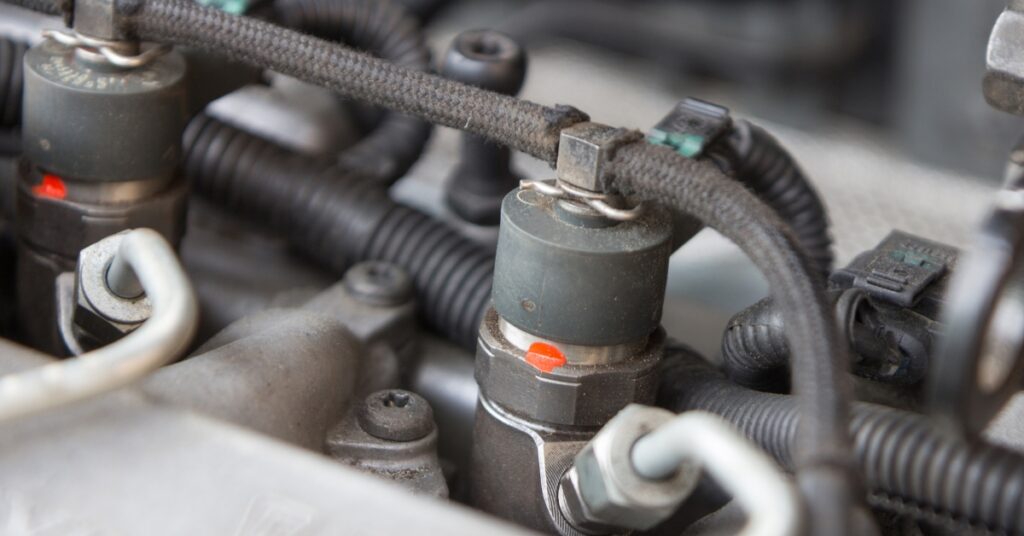
Table of Contents
Modern vehicles are designed for efficiency, power, and performance, and one of the technologies that makes this possible is direct fuel injection engines (DFI). Unlike older systems that mix fuel with air before entering the combustion chamber, direct injection sprays fuel directly into the cylinder. This design improves fuel economy and power output but comes with a unique maintenance need to clean out carbon buildup. Without regular maintenance, cars with direct fuel injection engines can suffer from reduced efficiency, performance, and even reliability.
What Is a Direct Fuel Injection System?
Direct fuel injection (DFI) is a modern fuel delivery system that sprays gasoline at very high pressure directly into each cylinder’s combustion chamber. This direct approach allows for precise control of how much fuel is injected and when, leading to better engine performance, improved fuel efficiency, and lower emissions compared to older systems.
The main difference between direct injection and port fuel injection is where the fuel is introduced. In port systems, gasoline is sprayed into the intake manifold before mixing with air, which helps clean the intake valves. With direct injection, that cleaning effect no longer happens because fuel bypasses the intake valves completely. While this design improves efficiency and power, it also makes engines more prone to carbon buildup on the valves and injectors over time, which is why routine maintenance becomes so important.
Why Direct Fuel Injection Systems Need Regular Maintenance
With direct fuel injection, performance can quickly decline if carbon buildup is ignored. Deposits form on intake valves, fuel injectors, and combustion chamber surfaces, restricting airflow and fuel delivery. Over time, this leads to rough idling, decreased fuel economy, and engine hesitation under acceleration. Regular maintenance helps prevent these issues, keeping your engine running smoothly and efficiently.
How Often Should Direct Fuel Injection Maintenance Be Done?
For most vehicles, direct fuel injection maintenance is recommended every 30,000 to 60,000 miles, though this can vary depending on your driving habits. Short trips, heavy stop-and-go driving, or poor-quality fuel can accelerate the rate of carbon buildup. Having a trusted shop, like McCullough NAPA Auto Care, inspect your system during scheduled maintenance visits helps ensure problems are caught early to better prevent long-term damage.
Common Problems Caused by Neglecting Your Direct Fuel Injection System
Ignoring direct fuel injection maintenance can cause several issues that worsen over time. At first, you may only notice a slight loss of power or reduced fuel economy, but when left unchecked, these problems can evolve into costly repairs, like injector replacement or even internal engine damage.
Carbon Buildup on Intake Valves
One of the biggest issues with DFI engines is carbon buildup on intake valves. Without the cleaning effect of fuel washing over them, these valves accumulate deposits from oil vapors and combustion byproducts. As the buildup thickens, airflow into the cylinder becomes restricted. This can result in misfires, sluggish acceleration, and higher fuel consumption. Professional cleaning services are the only way to remove these deposits effectively and restore performance.
Fouled Fuel Injectors
Fuel injectors are the heart of the direct injection system. When they become clogged or fouled with deposits, fuel cannot be delivered evenly or at the correct spray pattern. This causes rough idling, poor throttle response, and reduced power. Over time, injectors may need to be replaced, a repair that is far more costly than routine cleaning.
Reduced Fuel Economy
As valves and injectors accumulate deposits, the engine has to work harder to maintain performance. This added strain translates into more fuel burned per mile, making neglected DFI maintenance a direct hit to your wallet every time you fill up.
Engine Hesitation and Misfires
Restricted airflow and uneven fuel delivery can cause hesitation when accelerating and even engine misfires. Not only does this affect drivability, but it can also trigger your check engine light and put stress on other engine components.
The Benefits of Direct Fuel Injection Maintenance
The good news is that regular maintenance prevents most of these problems. Having your DFI system cleaned and inspected by ASE-certified professionals comes with multiple benefits:
Restored Performance – Carbon-free intake valves and clean injectors allow your engine to run the way it was designed, with smooth acceleration and strong power.
Improved Fuel Economy – Efficient combustion means you’ll get the most out of every gallon of gas.
Extended Engine Life – Preventative care reduces stress on your engine, minimizing wear and extending its lifespan.
Reduced Repair Costs – Routine DFI service costs far less than replacing injectors, valves, or major engine components.
Trust McCullough NAPA Auto Care for Direct Fuel Injection Service
McCullough NAPA Auto Care only staffs ASE-certified technicians capable of using the latest equipment and proven cleaning methods to keep your direct fuel injection system in peak condition. Whether you’ve noticed signs of reduced performance or are simply due for scheduled service, our team can help. Regular DFI maintenance is one of the smartest investments you can make in your vehicle’s long-term health.
